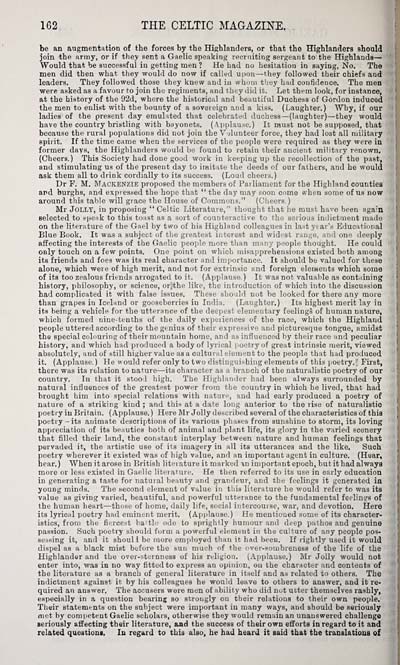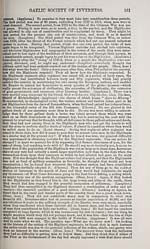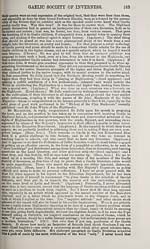Blair Collection > Celtic magazine > Volume 5
(172)
Download files
Complete book:
Individual page:
Thumbnail gallery: Grid view | List view

162 THE CELTIC MAGAZINE.
be an augmentation of the forces by the Highlanders, or that the Highlanders should
join the army, or if they sent a Gaelic speaking recruiting sergeant to the Highlands —
Would that be successful in getting men ? He had no hesitation in saying, No. The
men did then what they would do now if called u|)oh — they followed their chiefs and
leaders. They followed those they knew and iu whom tliey had confidence. The men
were asked as a favour to join the regiments, and they did it. Let them look, for instance,
at the history of the 92d, where the historical and beautiful Duchess of Gordon induced
the men to enlist with the bounty of a sovereign and a kiss. (Laughter.) Why, if our
ladies of the present day emulated that celebrated duchess— (laughter)— they would
have the country bristling with bayonets. (A))plau3e.) It must not be supposed, that
because the rural populations did not join the Volunteer force, they had lost all military
spirit. If the time came when the services of the people were required as they were in
former days, the Highlanders would be found to retain their ancient military renown.
(Cheers.) This Society had done good work iu keeping up the recollection of the past,
and stimulating ua of the present day to imitate the deeds of our fathers, and he would
ask them all to drink cordially to its success. (Loud cheers.)
Dr F. M. RFackenzie proposed the members of Pailiament for the Highland counties
ard burghs, and expressed the hope that " the day may soon come (vhen some of us now
around this table will grace the House of Commons." (Cheers.)
Mr JoLLT, iu proposing " Celtic Literature," thought that he must have been again
selected to speak to this toast as a sort of counteractive to the serious indictment made
on the literature of the Gael by two of his Highland colleagues in last year's Educational
Blue Book. It was a subject of the greatest interest and widest range, and one deeply
affecting the interests of the Gaelic people more than many people thought. He could
only touch on a few points. One point on which misapprehensions existed both among
its friends and foes was its real character and importance. It should be valued for these
alone, which were of high merit, and not for extrinsic and foreign elements which some
of its too zealous friends arrogated to it. (Applause.) It was not valuable as containing
history, philosophy, or science, or^the like, the introduction of which into the discussion
had complicated it with false issues. These should not be looked for there any more
than grapes in Iceland or gooseberries in India. (Laughter.) Its highest merit lay in
its being a vehicle for the utterance of the deepest elementary feelings of human nature,
which formed nine-tenths of the daily expeiiences of the race, which the Highland
people uttered according to the genius of their expressive and picturesque tongue, amidst
the special colouring of their mountain home, and as influenced by their race and peculiar
history, and which had produced a body of lyrical poetry of great intrinsic merit, viewed
absolutely, and of still higher value as a cultural element to the people that had produced
it. (Applause.) He would refer only to two distinguishing elements of this poetry." First,
there was its relation to nature — its character as a branch of the naturalistic poetry of our
country. In that it stool high. The Highlander had been always surrounded by
natural influences of the greatest power from the country in which he lived, that had
brought him into special relations with natur*^, and had early produced a poetry of
nature of a striking kind ; and this at a date long anterior to the rise of naturalistic
poetry iu Britain. (Applause.) Here Mr Jolly described several of the characteristics of this
poetry - its animate descriptions of its various phases from sunshine to storm, its loving
appreciation of its beauties both of animal and plant life, its glory in the varied scenery
that filled their land, the constant interplay between nature and human feelings that
pervaded it, the artistic use of its imagery in all its utterances and the like. Such
poetry wherever it existed was of high value, and an important agent in culture. (Hear,
hear.) When it arose in British litoiature it marked \n important epoch, but it had always
more or less existed in Gaelic literature. He then referred to its use in early education
in generating a taste for natural beauty and grandeur, and the feelings it generated ia
young minds. The second element of value in this literature he would refer to was its
value as giving varied, beautiful, and powerful utterance to the fundamental feelings of
the human heart — those of home, daily life, social intercourse, war, and devotion. Here
its lyrical poetry had eminent merit. (Apidause.) He mentioned some of its character-
istics, from the fiercest ba'tle ode to sprightly humour and deep pathos and genuine
passion. Such poetry should form a powerful element in the culture of any people pos-
sessing it, and it shoull be more employed than it had been. If rightly used it would
dispel as a black mist before the sun much of the cver-sombreness of the life of the
Highlander and the over-sternness of his religion. (Applause.) Mr Jolly would not
enter into, was in no way fitted to express an opinion, on the character and contents of
the literature as a branch of general literature in itself and as related to others. The
indictment against it by his colleagues he would leave to others to answer, and it re-
quired an answer. The accusers were men of ability who did not utter themselves rashly,
especially in a question bearing so strongly on their relations to their own people.
Their statements on the subject were important in many ways, and should be seriously
met by competent Gaelic scholars, otherwise they would remain an unanswered challenge
seriously affecting their literature, aj»d the success of their own efforts in regard to it and
related queationi. Iu regard to this also, he had heard it said that the translatious of
be an augmentation of the forces by the Highlanders, or that the Highlanders should
join the army, or if they sent a Gaelic speaking recruiting sergeant to the Highlands —
Would that be successful in getting men ? He had no hesitation in saying, No. The
men did then what they would do now if called u|)oh — they followed their chiefs and
leaders. They followed those they knew and iu whom tliey had confidence. The men
were asked as a favour to join the regiments, and they did it. Let them look, for instance,
at the history of the 92d, where the historical and beautiful Duchess of Gordon induced
the men to enlist with the bounty of a sovereign and a kiss. (Laughter.) Why, if our
ladies of the present day emulated that celebrated duchess— (laughter)— they would
have the country bristling with bayonets. (A))plau3e.) It must not be supposed, that
because the rural populations did not join the Volunteer force, they had lost all military
spirit. If the time came when the services of the people were required as they were in
former days, the Highlanders would be found to retain their ancient military renown.
(Cheers.) This Society had done good work iu keeping up the recollection of the past,
and stimulating ua of the present day to imitate the deeds of our fathers, and he would
ask them all to drink cordially to its success. (Loud cheers.)
Dr F. M. RFackenzie proposed the members of Pailiament for the Highland counties
ard burghs, and expressed the hope that " the day may soon come (vhen some of us now
around this table will grace the House of Commons." (Cheers.)
Mr JoLLT, iu proposing " Celtic Literature," thought that he must have been again
selected to speak to this toast as a sort of counteractive to the serious indictment made
on the literature of the Gael by two of his Highland colleagues in last year's Educational
Blue Book. It was a subject of the greatest interest and widest range, and one deeply
affecting the interests of the Gaelic people more than many people thought. He could
only touch on a few points. One point on which misapprehensions existed both among
its friends and foes was its real character and importance. It should be valued for these
alone, which were of high merit, and not for extrinsic and foreign elements which some
of its too zealous friends arrogated to it. (Applause.) It was not valuable as containing
history, philosophy, or science, or^the like, the introduction of which into the discussion
had complicated it with false issues. These should not be looked for there any more
than grapes in Iceland or gooseberries in India. (Laughter.) Its highest merit lay in
its being a vehicle for the utterance of the deepest elementary feelings of human nature,
which formed nine-tenths of the daily expeiiences of the race, which the Highland
people uttered according to the genius of their expressive and picturesque tongue, amidst
the special colouring of their mountain home, and as influenced by their race and peculiar
history, and which had produced a body of lyrical poetry of great intrinsic merit, viewed
absolutely, and of still higher value as a cultural element to the people that had produced
it. (Applause.) He would refer only to two distinguishing elements of this poetry." First,
there was its relation to nature — its character as a branch of the naturalistic poetry of our
country. In that it stool high. The Highlander had been always surrounded by
natural influences of the greatest power from the country in which he lived, that had
brought him into special relations with natur*^, and had early produced a poetry of
nature of a striking kind ; and this at a date long anterior to the rise of naturalistic
poetry iu Britain. (Applause.) Here Mr Jolly described several of the characteristics of this
poetry - its animate descriptions of its various phases from sunshine to storm, its loving
appreciation of its beauties both of animal and plant life, its glory in the varied scenery
that filled their land, the constant interplay between nature and human feelings that
pervaded it, the artistic use of its imagery in all its utterances and the like. Such
poetry wherever it existed was of high value, and an important agent in culture. (Hear,
hear.) When it arose in British litoiature it marked \n important epoch, but it had always
more or less existed in Gaelic literature. He then referred to its use in early education
in generating a taste for natural beauty and grandeur, and the feelings it generated ia
young minds. The second element of value in this literature he would refer to was its
value as giving varied, beautiful, and powerful utterance to the fundamental feelings of
the human heart — those of home, daily life, social intercourse, war, and devotion. Here
its lyrical poetry had eminent merit. (Apidause.) He mentioned some of its character-
istics, from the fiercest ba'tle ode to sprightly humour and deep pathos and genuine
passion. Such poetry should form a powerful element in the culture of any people pos-
sessing it, and it shoull be more employed than it had been. If rightly used it would
dispel as a black mist before the sun much of the cver-sombreness of the life of the
Highlander and the over-sternness of his religion. (Applause.) Mr Jolly would not
enter into, was in no way fitted to express an opinion, on the character and contents of
the literature as a branch of general literature in itself and as related to others. The
indictment against it by his colleagues he would leave to others to answer, and it re-
quired an answer. The accusers were men of ability who did not utter themselves rashly,
especially in a question bearing so strongly on their relations to their own people.
Their statements on the subject were important in many ways, and should be seriously
met by competent Gaelic scholars, otherwise they would remain an unanswered challenge
seriously affecting their literature, aj»d the success of their own efforts in regard to it and
related queationi. Iu regard to this also, he had heard it said that the translatious of
Set display mode to: Large image | Transcription
Images and transcriptions on this page, including medium image downloads, may be used under the Creative Commons Attribution 4.0 International Licence unless otherwise stated. ![]()
| Early Gaelic Book Collections > Blair Collection > Celtic magazine > Volume 5 > (172) |
|---|
| Permanent URL | https://digital.nls.uk/76450944 |
|---|
| Description | Volume V, 1880. |
|---|---|
| Shelfmark | Blair.6 |
| Attribution and copyright: |
|
| Description | A selection of books from a collection of more than 500 titles, mostly on religious and literary topics. Also includes some material dealing with other Celtic languages and societies. Collection created towards the end of the 19th century by Lady Evelyn Stewart Murray. |
|---|
| Description | Selected items from five 'Special and Named Printed Collections'. Includes books in Gaelic and other Celtic languages, works about the Gaels, their languages, literature, culture and history. |
|---|

